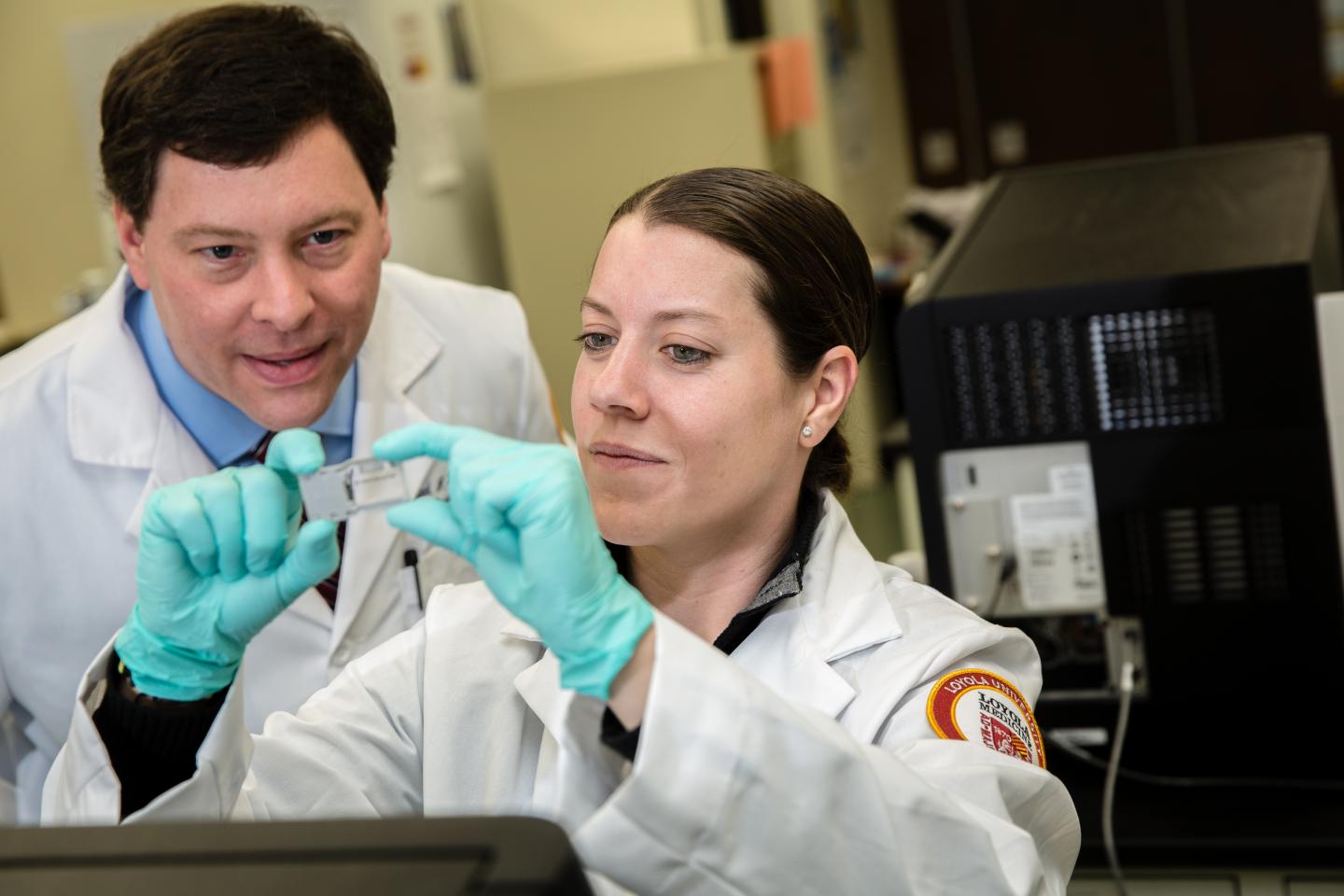
MAYWOOD, IL – Loyola researchers have identified a tumor gene that may help to predict survival outcomes in patients with cancer of the mouth and tongue.
If the gene is expressed (turned on), patients are 4.6 times more likely to die at any given time, according to a study by researchers at Loyola Medicine and Loyola University Chicago Stritch School of Medicine.
The finding, published in the journal Otolaryngology – Head and Neck Surgery, could help guide treatment, researchers say. If the cancer gene is expressed, a patient may require more aggressive treatment, such as radiation and possibly chemotherapy in addition to surgery. Conversely, if the gene is unexpressed (turned off), the patient might be able to safely forgo aggressive treatment and undergo surgery alone.
The Gene Expression Barcode, a research tool co-invented by Michael J. Zilliox, PhD, was used to examine genetic data from 54 patients with mouth cancer. Zilliox is corresponding author of the study, director of the Loyola Genomics Facility and an assistant professor in Loyola Stritch School of Medicine and Graduate School's department of public health sciences.
The study involved a type of mouth cancer called squamous cell carcinoma. Physicians estimate survival based on the stage of the disease. Staging is based on factors including the size of the tumor and whether it has spread to nearby lymph nodes or other organs.
But staging provides an imprecise estimate of prognosis. In some cases, patients with early-stage disease can have worse outcomes than patients with later-stage disease. Previous studies have found that patients with oropharynx cancers associated with the human papillomavirus (HPV) tend to have better outcomes. But there is no reliable biomarker to predict outcomes among patients who are HPV negative, said Carol Bier-Laning, MD, a Loyola head-and-neck cancer surgeon and co-author of the study. Dr. Bier-Laning is an associate professor in Stritch School of Medicine's department of otolaryngology.
Using the Gene Expression Barcode, researchers examined publically available genetic data from 54 tumor samples. The samples were taken from patients who had HPV-negative squamous cell carcinoma in the mouth.
The study found that subjects whose tumors expressed a gene called spectrin were 4.6 times more likely to die at any given time when compared with patients without spectrin. (Spectrin is a gene involved in the formation of cell membranes.)
Even when researchers controlled for cancer stage and other factors, patients with the expressed spectrin gene still were significantly more likely to die than those in which the gene was turned off. This finding suggests that the spectrin gene may provide more information about survival than cancer stage alone.
The researchers caution the results are preliminary and need to be validated in an independent patient group. Such research is ongoing.
Research institutions have made public genetic data from nearly 100,000 patients, most of whom had cancer. In raw form, however, these data are too unwieldy to be of much practical use for most researchers. The Gene Expression Barcode applies advanced statistical techniques to make the mass of data much more user-friendly to researchers.
The barcode algorithm is designed to estimate which genes are expressed and which are unexpressed. Like a supermarket barcode, the Gene Expression Barcode is binary, meaning it consists of ones and zeroes – the expressed genes are ones and the unexpressed genes are zeros.
###
The Gene Expression Barcode has received funding from the National Institutes of Health and Loyola institutional funds, and is available to academic researchers at no charge.
The new study is titled "Candidate biomarkers for HPV-negative head and neck cancer identified via Gene Expression Barcode analysis." Other co-authors are Shiayin Yang, MD (first author) and William Adams.
Media Contact
Jim Ritter
[email protected]
708-216-2445
@LoyolaHealth
http://www.luhs.org
The post Discovery of cancer gene may predict survival in patients with mouth cancers appeared first on Scienmag.





